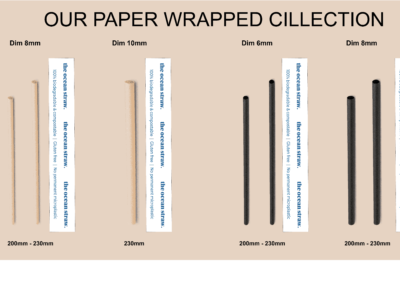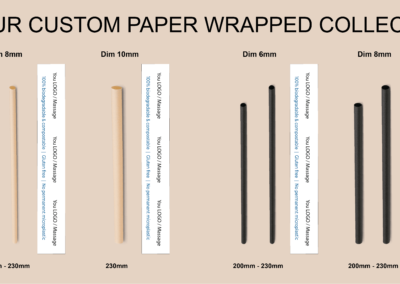THE OCEAN STRAW

EVERY YEAR, MILLIONS OF TONS OF PLASTIC END UP IN THE OCEAN
Disposable plastics are posing serious problems for our planet. All that plastic degrades into tiny particles — microplastics — that last forever and cause a serious threat to ecosystems and human health. Thankfully, governments have started to act and across Europe, a single-use plastic ban came into effect in 2021 targeting straws among other products. As a result, businesses need an alternative that is acceptable to consumers while doing good for the environment.
OUR MISSION
Our mission is to reduce waste and microplastic pollution by offering reusable products made from sustainable substitutes. This goes way beyond just selling straws: we want to make them an experience for environmentally conscious people, encouraging their active participation in shaping a more sustainable future.
OUR STRAWS ARE THE EVOLUTION OF STRAWS
Our straws are a premium, reusable product made in Spain. They are designed to fit into a circular economy: Reducing, reusing and recycling are key methods for circularity and saving the natural resources.
- They are made entirely from a unique raw material whose components are sustainably sourced wood and plant-based binders, using advanced extrusion technology. This process involves no addition of other products or additives to the raw material. Existing plastic products’ extrusion machinery is used and this approach eliminates the need for investments in new production lines.
- They have a natural look and feel. They are strong and resistant, and are free from allergens or gluten. They are intended and designed for multiple uses: certified reusable (up to 10 times) and dishwasher safe. We actively promote their reusable nature so that people also conceive, perceive and use them as intended.
- They are the perfect alternative to single-use plastic straws and a superior option to paper straws. Unlike paper straws, which experience a significant loss of strength within just 30 minutes when immersed in liquids, our straws can be used for up to 24 hours without getting soggy.
Our straws are both user and planet friendly.
STRAWS DIMENSIONS
Our straws are available in 3 colours: natural, black or red. They have a safe and
circular design. They can be delivered with or without paper wrapping.
- 3 diameters: 6 mm, 8 mm and10 mm.
- 3 lengths: 150mm, 200mm and 230mm.
- We can process specific custom orders on demand.
- The 6mm straw is perfect for most drinks.
- The 8 mm is excellent for thicker drinks such as smoothies.
- The 10 mm is perfect for smoothies and milkshakes.
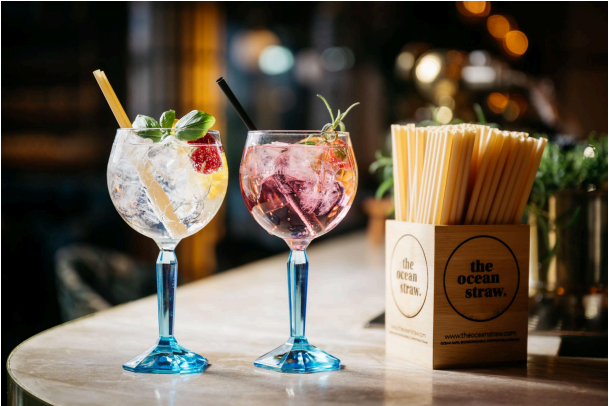
STORAGE & TRANSPORT CONDITIONS
- It is recommended to store the straws in their closed, original packaging at
- temperatures below 45°C.
- Storage in direct sunlight or in rain should be avoided.
- Avoid storage in high humidity environments (>70%).
- Temperatures during transportation and storage may not exceed 45°C at any time.
- The shelf-life of the straws in room temperature (23°C) is 24 months.
KEY FEATURES
PREMIUM QUALITY
- Unique look and feel.
- Beautiful, natural appearance thanks to its unique raw material.
OUTSTANDING USABILITY
- Superior usability, strong and resistant. Don’t get soggy.
- Can be used for up to 24 hours with food temperature of 40°C max. Suitable for acidic and oily food (for max. 2h, 70°C).
- Certified as reusable up to 10 times & dishwasher safe (tested according to UNE EN 1186/DIN EN 12875).

PLANT- BASED - KEEP CARBON CYCLE IN BALANCE
- Made from biodegradable bio-polymers originating from plants and wood from industrial side streams.
- Biodegrade into CO2, water and biomass. This CO2 can be absorbed by trees when they grow, keeping the carbon cycle in balance.
NO PERMANENT MICROPLASTICS
- Doesn’t accumulate in nature but circulates back to natural components, just like tree leaves: Can be digested by naturally occurring microorganisms.
- No ecotoxic chemicals or micro plastics are released, either during use or at the end of the straw’s life.
- No harmful impact on the ecosystem.
ORGANICALLY RECYCLABLE
- Organically recyclable via industrial composting.
- European standard EN 13432 (Always check local recycling instructions, as this may vary depending on location).
SAFE FOR PEOPLE AND THE PLANET
- Straw material not considered harmful to aquatic organisms.
- Comply with European food contact material legislation.
- Allergen-free and gluten-free.
THE BEST SUSTAINABLE ALTERNATIVE COMPARED TO OTHER OPTIONS
Paper straws
Paper straws get soggy in 30 minutes and can easily turn into mush. They can become a choking hazard for small children chewing them. Furthermore, paper straws may contain glue to hold their form, which can break into microplastics. According to recent studies, many paper straws contain alarmingly high concentrations of PFAS, some of which have been linked to an increased risk of cancer, reproductive disorders, hormonal disruption, and
weakening of the immune system along with other health hazards.
PLA straws
Straws made of PLA like cornstarch or sugar cane are biodegradable under industrial composting at high temperatures. In the ocean, they have not been found to degrade at all over a year. The production process of these straws involves significant energy use and carbon emissions. They also fall short when used with hot drinks like coffee or tea.
Bamboo straws
Straws made of bamboo are reusable, durable, and biodegradable. However, their production involves the use of chemicals and a significant amount of water, and requires investments into specific production lines, making it less sustainable than it appears.
Grass Straws
Grass straws are a relatively new alternative. They are made from natural grass and are fully biodegradable, making them a sustainable option. They are gluten-free, reusable, and have a smooth surface that is easy to clean. However, they are not suitable for hot drinks and much like Bamboo straws, their production requires investments into specific production lines.
Wheat straws
Straws made from wheat stalks are claimed to be biodegradable. But they are not strong or suitable for long-term use, especially in liquid. They may not be the most suitable choice for people with wheat allergy. Furthermore, farmers often use pesticides to ensure high-yield wheat production. If these chemicals remain on the straw and are not adequately cleaned and processed before being turned into drinking straws, residues of these chemicals could potentially find their way into our drinks.
Avocado Straws
Avocado straws are made from avocado pits and are fully biodegradable and compostable. However, they can be expensive, and like other types of sustainable straws, their production requires investments into new production lines.
Pasta straws
Pasta straws present a unique, biodegradable alternative. However, they tend to get soft when in contact with liquid for extended periods and aren’t suitable for hot beverages. Also, they’re not gluten-free friendly!
Rice Straws
Rice straws are made from rice flour and are fully biodegradable and compostable. They can only last for up to an hour in cold drinks and are not suitable for hot drinks.
WE COLLABORATE WITH THE BEST
Our straws are made entirely from a patented granulate pulp sourced from a company certified with ISO 9001 and ISO 14001 standards. This material has been developed in collaboration with a Finnish/Swedish company leader in the development and production of solutions based on wood and biomass.
Our straws combine this unique material recipe and an advanced extrusion technology developed by our partner, a Spanish facility specialising in the production of compostable products.
A UNIQUE RAW MATERIAL
The raw material used in our straws is designed to mimic the beauty, functionality and circularity of nature. It serves as a sustainable alternative to PS (PolyStyrene) and PP (PolyPropylene), and is also used to replace PLA (Polylactic Acid, a bio- based polyester), thanks to its excellent processability, fast biodegradation and distinctive natural appearance.
- It is certified as industrially compostable (ASTM D6400 standard) by the US Biodegradable Products Institute (BPI) and biodegrades without leaving
permanent micro plastic or toxic load behind. - It meets the EU and FDA requirements for food contact materials.
- The raw material is cu rrently made for various applications and used by luxury brands such as Chanel or Shisheido.
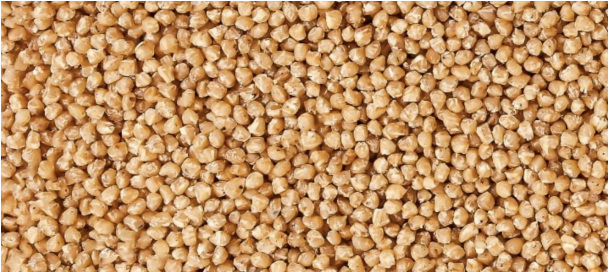
OCEAN SAFE
The biodegradability, ecotoxicity and threshold values for heavy metals of the raw material have been tested by an independent laboratory (ISO/IEC 17025 certified).
LABORATORY ENVIRONMENT
Test done into natural sea water, monitoring the production of CO2 production (ASTM6691). Based on these observations, the time for complete biodegradation has been estimated.
NATURAL ENVIRONMENT
Test done in the open water of the Baltic Sea, measuring the weight loss.
ECOTOXICITY TESTING
Test for per- and polyfluoroalkyl substances (PFAS) where no PFAS compounds were detected. Not considered harmful to plankton in the marine ecosystem (analysed in the Daphnia magna plankton toxicity test according to OPPTS 850.1010 & OECD 202).
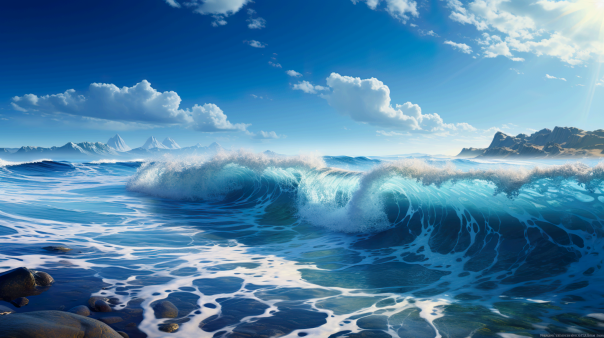
According to a recent study, %4 of people across Europe and the Americas associate the word “plastic” with ocean litter. Researchers estimate that 8 million tons of plastics are added to the ocean every year. While half of the plastic that is produced is single-use, these items make up 89% of ocean plastic. Studies are projecting that by 2050, there will be more plastic in the sea than fish!
Switching to the Ocean Straw contributes to reducing waste and keeping our oceans a place for fish, not litter.
LOWER CARBON FOOTPRINT
Plastic production is one of the most greenhouse-gas heavy industries in the world. It is notoriously energy intensive, first of all. Plastics are produced from fossil fuels and they are known to release greenhouse gases such as methane and ethylene as they degrade. The problem of plastic is not limited to their physical effect on sea life or their chemical impact on the earth. Throughout their entire lifecycle, from their manufacture to their disposal, plastics are contributing to global warming. As a result, by adopting sustainable solutions, businesses are contributing to the battle against climate change too.
The raw material used for producing our straws comes from renewable resources which is more ecologically sound. As a result, they have a lower carbon footprint and avoid a dependence on non-renewable resources. When trees and plants grow, they absorb CO2 from the atmosphere via photosynthesis. When the Ocean Straw biodegrades into CO2, water and biomass, its carbon cycle stays in balance with nature.
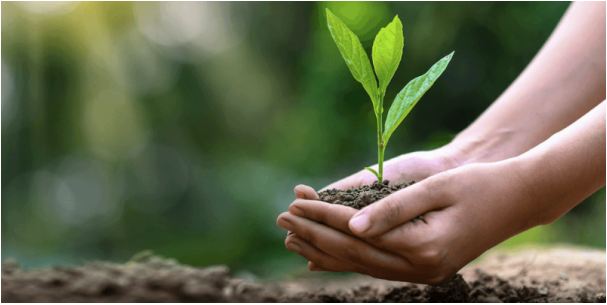
END OF LIFE & RECYCLING
Natural degradation: If the straw finds itself accidentally in nature, it will degrade naturally over time without causing damage to the environment. (Relative biodegradation of 75,5% in 420 days in simulated marine environment test – ASTM D6691, 86°F / 30°C using natural sea water – Not considered biodegradable in California).
Industrial composting: The preferred disposable method is industrial composting. This is a specific form of material recycling (EU Directive 94/62/EC) for compostable products produced in accordance with European standard EN 13432. In this process, organic materials are digested by microorganisms in the presence of oxygen. The compost is rich in nutrients and can be for example used in agriculture to enhance the quality of the soil.

